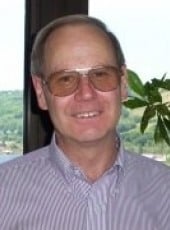Marshall W. Logue

Contact
- Professor Emeritus, Chemistry
- PhD, Ohio State University
Biography
Dr. Logue's research interests are in the application of organic synthesis to carbohydrates, C-nucleosides, and nucleotide analogues.
Carbohydrates
A number of nucleoside antibiotics contain unusual carbohydrates. Synthetic routes
to these types of antibiotics would be greatly simplified if regio- and stereoselective
modifications of the common carbohydrates were available. To this end, we are investigating
the reactions of the carbohydrate cyclic ortho esters with organosilicon reagents.
C-nucleosides
C-nucleosides are nucleosides that contain a carbon - carbon linkage, instead of the
normal carbon - nitrogen linkage between the carbohydrate and the heterocyclic base.
This carbon - carbon linkage makes the synthesis of C-nucleosides much more difficult
than the synthesis of normal nucleosides. Although a number of routes have been developed
for C-nucleoside synthesis, most are not very general in scope. Because alkynyl ketones
are excellent substrates for elaboration to heterocyclic bases, we are interested
in developing short and high-yield syntheses for glycosyl alkynyl ketones, which should
serve as excellent precursors for C-nucleosides.
Nucleotide Analogues
Many of the nucleoside antibiotics exhibit their activity only after conversion into
their nucleotide form (mono- or triphosphate) once inside the cell. A number of nucleoside
analogues which were expected to exhibit antibiotic activity were inactive because
they are not substrates for the enzymes that phosphorylate nucleosides. Nucleotides
themselves are not very useful as antibiotics because they are ionized at physiological
pH and cannot be readily cross cell membranes. We wish to synthesize some nucleotide
analogues, including acyclic C- nucleotide analogues, that have phosphate group masked
as phosphate esters. These phosphate esters being covalent will be less polar and
more able to cross cell membranes. However, the masking groups must be chosen such
that they will be readily cleaved by cellular enzymes once inside the cell to free
up the active nucleotide.
Research Interests
- Application of organic synthesis to carbohydrates, C-nucleosides, and nucleotide analogues
- Reactions of carbohydrate cyclic ortho esters with organosilicon reagents
- Developing short and high-yield syntheses for glycosyl alkynyl ketones
- Synthesis of nucleotide analogues, including acyclic C- nucleotide analogues, that have phosphate group masked as phosphate esters